Round-up: 2022 Early Career Grants programme awardees
The funding for our 2022 Early Career Grants Programme is almost finalized and as in past years we want to share with you key information about our winners.
So far we have awarded 202 grants to early career professionals around the world, from a total of 1,914 applications. This is fantastic news and compares with just 16 grants given out in 2018. It is our ambition to grow the number of grants we can provide each year, and although we also awarded 202 grants in 2021, we are talking to one of our donors who may be able to fund an additional 5 awards to reach 207 grants for 2022.
We have been delighted to increase the number of awards over the last 5 years by a factor of twelve, as this means more and more early career professionals have been able to carry out their first research projects. Through their year-long projects we hope they have learned new skills, had new experiences and grown their networks. For some the projects also enable them to identify the next stage of their career, to have their work implemented or disseminated, and to start new collaborations.
Thank you to our donors
The growth in awards is due to the incredible support received from our partners. The Department of Health and Social Care via the National Institute for Health Research has funded 160 grants, and the Hamish Ogston Foundation have funded 20 awards as part of the Hamish Ogston Foundation Platinum Jubilee Grants for early career health professionals.
Wellcome Trust has funded 10 grants, and the International Trachoma Initiative (ITI) 4 grants. The Journal of Comparative Pathology Education Trust (JCPET) and The International Alliance for the Control of Scabies (IACS) have each funded one grant. The RSTMH have also funded 6 grants this year.
Thank you to our Global Assessors
As in all years, the only reason we are able to run such a large programme is due to the hard work and dedication of our voluntary Global Assessors, whose role is to review the applications and carry detailed assessments. Each application is reviewed by at least two Assessors, who apply their experience and skill to provide this important quality review.
We would not have been able to deliver our Early Career Grants Programme without this group of around 60 Assessors across the world, and we would like to thank them for their time and dedication in collectively carrying out over 3,000 assessments, which is a record for RSTMH.
We wanted to share some more detailed analysis of the awardees, including the gender split, thematic areas, countries where research will be carried out and where our researchers are based, and a little more detail on the awardees themselves.
Gender split
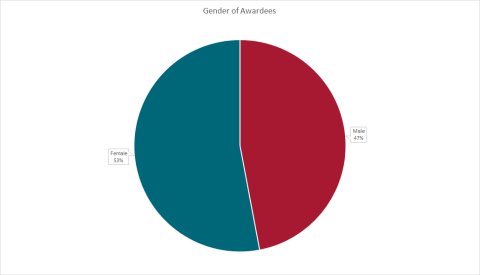
As you can see below our Grants are being provided to a group which is 53% female, and 47% male.
We know first hand from other areas of work that it is difficult to support and recognise the success of females and males equally in our field of work. It is therefore great news to see this result. This compares with a split of 41% female and 58% male at application stage, with 1% preferring not to say.
Research location and nationality of awardees
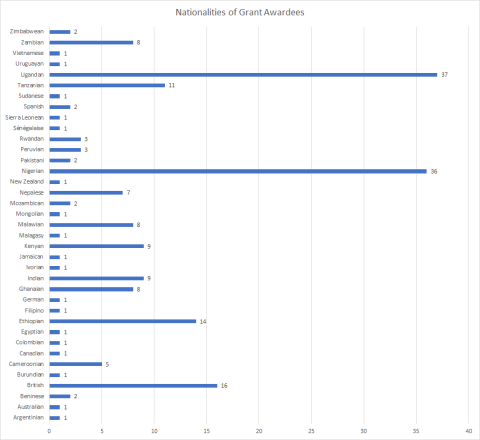
Our cohort of 2022 grant awardees are from 36 countries, compared to 42 in 2021. Of these, 70% are from Africa, 10% were from Asia. We were pleased to see increased coverage across world regions compared to last year. The country with the highest number of recipients is Uganda at 37, followed by Nigeria at 36.
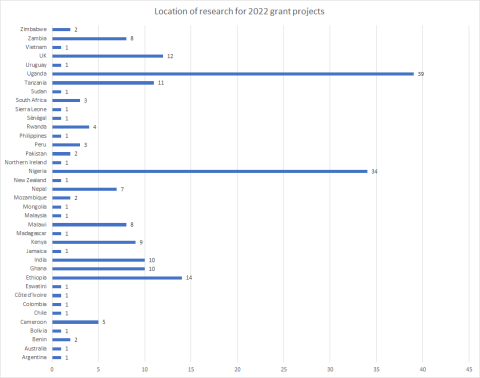
The research location of the studies being funded is equally broad, mapping closely the nationality of our awardees, as shown below.
Research areas
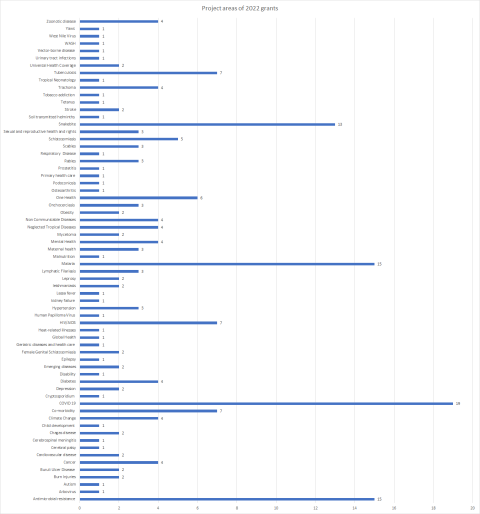
This year we were able to loosely classify the studies across 67 areas of global health, although we accept this is a very simplified view of the studies which often involve multiple disease areas or topics. The most popular topic is COVID-19 (19) followed by Malaria (15), drug resistance (15) and Snakebite (13). We were also pleased to see awards for cross cutting issues such as climate change, co-morbidities, disability and mental health. There were more projects focused on non-communicable diseases this year.
Roles of awardees
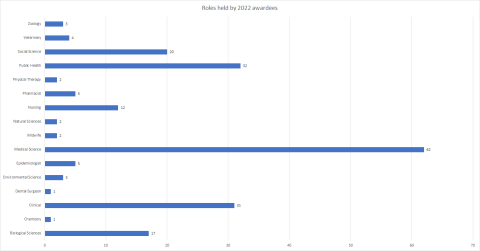
One of the goals of our Early Career Grants Programme is to ensure we are providing grants to a broad range of early career professionals working in roles across the health community. This year we have also seen a greater range of profession represented by our awardees, as seen below. There are many individuals who are currently working in medical sciences, clinical roles and in public health specifically. We are also pleased to see an increase in social scientists, and also those from the professions of veterinary science, nursing and in zoology.
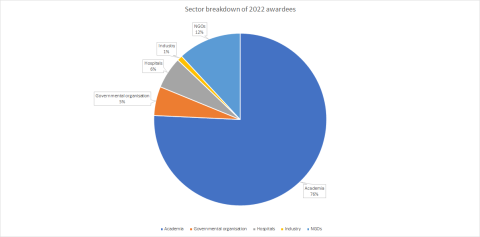
Similarly we want our grants to be received by professionals working in all areas of health setting, and we can see below the breakdown for this cohort. The vast majority are from academic settings, as we would expect for research grants, however we are rally delighted to see a number of awardees based in hospitals, NGOs, governments and also industry. We would like as many people from as many different areas of healthcare as possible to have the opportunity to carry out their first research projects, and kick start their careers.
We wish our awardees the very best of luck with their projects, which are likely to be the first projects they will be delivering themselves. We hope that this opportunity brings new skills experiences and networks. Whatever the results of their projects we also hope this helps them to decide the next steps in their careers, and that we are able to support them in this.
While we wish these awardees goof luck with their projects we continue to work with our awardees from 2019 to 2021, many of which had setbacks due to lockdown and covid-19, and we look forward to bringing you updates on the success of these cohorts very soon.
As we make final plans to launch our next five-year strategy we hope that we are able to give out many more grants to the future leaders, innovators and professionals of the future over the next five years.
